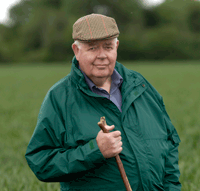Forget buzz words, we need action

I must be careful not to betray my relative ignorance of IT. I can, however, use Google and other search engines by typing in key words or phrases, references to which appear when you click “Search”.
My impression from attending the NFU Conference last week was that officers and speakers had adopted a similar idea – for there were lots of key words and phrases in their presentations.
One was “sustainable intensification”. It’s suddenly emerged as the buzz phrase of DEFRA politicians to describe what they want farmers to do. And sure enough, DEFRA secretary Caroline Spelman used it in her speech. It means producing more while also enhancing the environment.
It encompasses the Campaign for the Farmed Environment, as well as the need to increase self-sufficiency. It’s a familiar theme for me because I preached it regularly when I chaired LEAF.
And while I am as frustrated as every other farmer at having to record everything I do on the farm, I support both DEFRA and the NFU in urging farmers to adopt what CFE calls for to avoid the re-introduction of compulsory set-aside. We could all live to regret it if we don’t.
Another phrase I noticed was the “fight for dirt” used by Paul Conway, senior vice-president of Cargill. He was talking about how wealthy individuals, institutions and even governments have been investing in huge tracts of land around the world in recent years. Their motivation? It’s the inevitable food shortage that they perceive as coming. Investors believe they will make a lot of money. Governments are more concerned with guaranteeing food supplies for domestic populations. It was a positive message for those of us already in possession of land.
But he went on to use another key phrase that was not quite as comfortable – “volatility is here to stay”. Here was a man whose international conglomerate is the biggest commodity trader in the world. Doubtless, his company has benefited from soaring prices over recent months. But he had no hesitation in saying such prices would not last and, by implication, that risk management would be even more important in the future.
He used another phrase that showed he detected a new mood across world farming – “agriculture at the top of the agenda”. It was a theme NFU president Peter Kendall had stressed when opening the conference, when he called for farming to be at the heart of the UK economy and regretted that the coalition government had so far failed to put it there.
Indeed, he challenged Caroline Spelman to raise farming’s status. To do that we need a food plan, he declared. We don’t have one at present and the 20/30 plan inherited from the last government was out of date and not enough, especially following publication of the Foresight Report on food security, he said. Farmers are part of the answer to global challenges, he added, and recognition of this in the corridors of power is vital and urgent.
Perhaps the most inspiring session at the conference was a discussion on “the next generation”. Nearly 80 young farmers had been invited to attend and there in the room were at least as many old fogeys, like me, who were equally concerned for the future of our industry.
Frustration was expressed by some at the problems the young have acquiring farms and capital. But there was enthusiasm and determination, too. The key phrases there were “the right attitude” and “get up and go”.
David Richardson farms about 400ha (1000 acres) of arable land near Norwich in Norfolk in partnership with his wife, Lorna. His son, Rob, is farm manager.
Read more from Richard and our other Farmers Weekly columnists.

